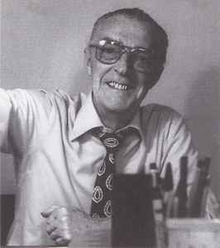Manfred Minnich
Manfred Minnich | |
|---|---|
 | |
| Personal details | |
| Born | 12 December 1923 Fischbach, Quierschied, Saarland, Germany |
| Died | 17 August 1985 Fischbach, Quierschied, Saarland, Germany |
| Nationality | |
Manfred Minnich (1923–1985) is a German trumpet player, composer, arranger and conductor, born on the 12th of December in 1923 in Fischbach, a small town in the municipality of Quierschied in the German state of Saarland. There are very limited sources about Minnich, he founded the SR Dance Orchestra and was its leading conductor until 1964, and then handed over the orchestra to Eberhard Pokorny to lead, but continued working for the SR Dance Orchestra[1] as an editor. He then passed away on the 17th of August 1985 in his hometown of Fischbach.[2] Minnich also had many different pseudonyms people knew him by: “Boris Schoska, George Potella, and George Winters”.
Early life
[edit]Manfred Minnich, born in 1923, grew up in Nazi Germany, his early life is not well documented. But from when Minnich was young he had fostered a talent for music, mainly with the trumpet, this became his main instrument. In his later life he expanded in the industry by joining the composing scene, this led to the creation of the SR Dance Orchestra.
Career
[edit]Manfred Minnich primarily played the trumpet; this was his main instrument throughout his career. He wasn't just a trumpet player, he was a conductor, music composer, and arranger. He contributed widely to the post-war music in Germany. Minnich was encompassed in many different groups, he was most notable as the founder of the SR Dance Orchestra, there he played and directed music up until 1964. He was a part of several more different orchestras, these include Orchester David Summerfield, Orchester Manfred Minnich, Orchester Michael Coster, Tanzorchester Des Saarländischen Rundfunks, The George Winters Band, The George Winters Orchestra, The Manfred Minnich String Orchestra.[3] Minnich's career is marked by many key achievements and important dates, founding several different orchestras is a large achievement, he led the orchestra till 1963 when he handed it over to Eberhard Pokorny,[4] he stepped down from the conducting role but continued to still contribute as a music editor, this kept his ongoing influence in the music scene. Unfortunately, Minnich did not win any awards etc. He was a niche composer, and his talent was not well recognized.[5] Minnich's most successful song is "No more",[6] being used in many pieces of media as well as in popular video games like Roblox, and well known children's cartoon, SpongeBob SquarePants.[7]
Radio Plays
[edit]As a Composer
- 1955: Klaus L. Graeupner: The Ballad of Kunibert – Director: Peter Arthur Stiller (Short Radio Play – Radio Saarbrücken)
- 1956: Walter Kolbenhoff:At the End of the Street – Director: Peter Arthur Stiller (Radio Play – SR)
- 1956: Lester Powell: Lady in the Fog (8 episodes) – Director: Albert Carl Weiland (Original Radio Play, Crime Radio Play – SR)
- 1956: Hans Hömberg: Japanese Dream Play – Director: Peter Arthur Stiller (Original Radio Play – SR)
- 1957: Lester Powell: The Lady is Blonde (8 episodes) – Director: Albert Carl Weiland (Original Radio Play, Crime Radio Play – SR)
- 1959: Lester Powell: The Lady with the Gray Curls (8 episodes) – Director: Albert Carl Weiland (Original Radio Play, Crime Radio Play – SR)
- 1960: Lester Powell: The Lady Films (8 episodes) – Director: Albert Carl Weiland (Original Radio Play, Crime Radio Play – SR)
- 1961: Lester Powell: The Lady Writes (8 episodes) – Director: Albert Carl Weiland (Original Radio Play, Crime Radio Play – SR)
- 1962: Hans Hömberg: The Horse of the Cheerful Lark – Adaptation and Direction: Jörg Franz (Original Radio Play – SR)
- 1962: Wolfgang Altendorf: The Kraptaken-Tuft – Director: Jörg Franz (Original Radio Play – SR)
- 1962: Rainer Puchert: Manoeuvre – Director: Miklos Konkoly (Radio Play – SR)
- 1964: Lester Powell: The Many-Loved Lady (6 episodes) – Director: Albert Carl Weiland (Original Radio Play, Crime Radio Play – SR)
- 1971: Lester Powell: The Lady is Reckless (5 episodes) – Director: Albert Carl Weiland (Original Radio Play, Crime Radio Play – SR)
Source: ARD-Hörspieldatenbank[8]
Discography
[edit]- 1970: Gerhard Narholz Orchestra, Manfred Minnich Orchestra – Dance Express, Tip Record Production
- 1970: The Manfred Minnich String Orchestra, Studio One
- 1971: Retro Things With Strings – Manfred Minnich
- 1973: Music for Dancing, Karussell[9]
- 1973: Manfred Minnich Orchestra/Herbert Küster Orchestra – Midnight Party, Karussell
- The Manfred Minnich Orchestra/The Gerhard Narholz Orchestra, Studio One
- Manfred Minnich Orchestra/Ernst Bogenhaus, Europhon
- Manfred Minnich Orchestra, Rick Lane Orchestra – Dance Party, Tyrolis
- The Manfred Minnich String Orchestra, Studio One
Weblinks
[edit]"Die Orchester der Saarbrücker Radiosender". Saar-Nostalgie. Retrieved 2024-11-30.
References
[edit]- ^ https://www.discogs.com/master/3231493-The-Manfred-Minnich-String-Orchestra-The-Manfred-Minnich-String-Orchestra
- ^ https://www.discogs.com/artist/438556-Manfred-Minnich
- ^ "The Manfred Minnich Orchestra music, videos, stats, and photos". Last.fm. 2024-04-16. Retrieved 2024-10-15.
- ^ https://www.discogs.com/artist/3984783-Eberhard-Pokorny
- ^ "EBERHARD POKORNY". jazzpro.nationaljazzarchive.org.uk. Retrieved 2024-10-15.
- ^ https://rateyourmusic.com/artist/manfred-minnich
- ^ MonsieurCommandoMan (2010-08-02). SpongeBob SquarePants Production Music - Waltzing Flutes. Retrieved 2024-11-03 – via YouTube.
- ^ "ARD Hörspieldatenbank: Suche". hoerspiele.dra.de (in German). Retrieved 2024-11-29.
- ^ Orchester Manfred Minnich - Music For Dancing, 1973, retrieved 2024-12-02
- 1923 births
- 1985 deaths
- Musicians from Saarland
- German male trumpeters
- 20th-century trumpeters
- 20th-century German composers
- German male composers
- German music arrangers
- 20th-century German conductors (music)
- German male conductors (music)
- 20th-century German male musicians
- German composers
- Musicians from Quierschied
